Meet Our Twelve 3MT Participants for 2020!
Simon Spahrkäs – Medical Sciences
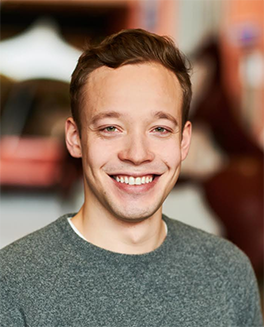
Cancer-related fatigue is the number one side effect of cancer and cancer treatment, affecting millions of people all around the globe. Tremendous fatigue can last for up to 10 years after treatment, putting an extreme burden on patients' daily functioning and their quality of life. Good news: There are different evidence-based treatment options available, for instance, mindfulness-based cognitive therapy (MBCT) combined with physical-activity exercises. Bad news: Effective treatment options are limited and reach only a small number of patients in need since one therapist can only treat one patient at a time. Therefore, the start-up Tired of Cancer developed a stand-alone, self-management intervention in the form of an app, intending to reach as many patients as possible. The so-called Untire app is evidence and clinical practice-based, containing psycho-education, exercises in mindfulness-based stress reduction, physical activity, tutorials, and daily tips.
With a background in psychology and medical sciences, I got the tools in my hands to examine whether this novel state-of-the-art mobile phone app is effective in reducing cancer fatigue and improving the quality of life for cancer patients and survivors. To answer this question, I carried out a large scale randomized clinical trial, recruited 799 cancer patients and survivors in four English speaking countries, randomly allocated participants into intervention (with app-access) and waiting-list control group, and observed outcomes over 12 weeks.
I want to share my research findings with you, and if I win the 3MT Competition, I aim to present at the World Psycho-Oncology Congress (IPOS 2020), in Kyoto, Japan.
Olga Bernadet – Science and Engineering
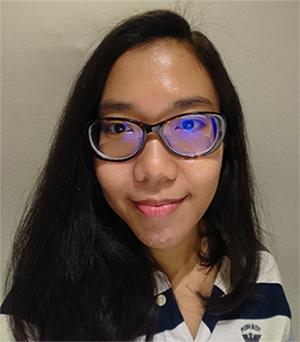
I am a 1st year PhD in the Faculty of Science and Engineering. My PhD project focuses on a biological activated carbon system for water purification. In this system, bacteria and activated carbon work together to remove pollutants that are difficult to remove from water. The pollutants can be harmful not only for the environment, but also for human health in the long run.
The process of pollutants removal by biological activated carbon is still unknown and I am trying to understand it through my research. I believe the knowledge will be beneficial for improving water quality. Biological activated carbon is a cheap and easy process, but nonetheless an effective system for pollutant removal. The knowledge obtained from my research will hopefully increase the application of this technology for improving water quality and enabling water recycling in the future.
I join the 3-minute thesis competition to introduce my research to a broader audience. By talking to a more general audience, not only can I improve my presentation skills, but I can also create awareness about the problem we currently have with our water. Such awareness is important to promote more research about water, especially for pollutants removal from water. The more research we do, the more alternative solutions we have, and the faster we solve the problems with water quality and safety.
Vera de Bel - Sociology
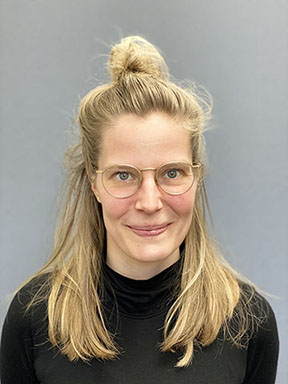
My name is Vera de Bel (Sociology, BSS) and I am in the final stages of my PhD. I join the competition to practice summarizing my studies and to explain my findings to a larger audience. My presentation is about the ripple effect in family networks. I will explain four relational structures in divorced and non-divorced family networks:
1) how balance in the sibling-mother-sibling triad affects the mutual sibling relationship
2) how ambivalent family triads, with positive and negative ties, affect mother’s self-esteem
3) whether grandchildren substitute less contact with one grandparental couple by more contact with the other grandparental couple
4) how multi-functional relationships, characterized by multiple dimensions such as affection and instrumental support, affect family members’ well-being
I conclude that parental divorce affects the relationship between parents and their children, but also the relationships with other family members and their well-being. Because family relationships are interdependent, parental divorce has a ripple effect on the family network.
Janouk Kosters – Medical Sciences
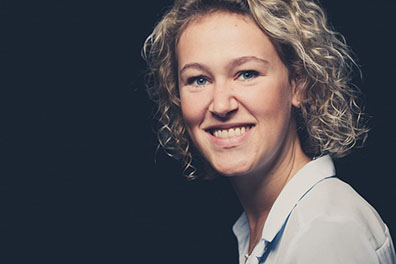
Sounds are always around you. 24 hours a day and seven days a week. These sounds can be pleasant, but also annoying. Healthy humans can filter irrelevant sounds out, but what if you can’t, and have problems understanding the world around you? This is reality for people with dementia. As a PhD-student at the department of elderly care medicine, I want to raise awareness about the sound environment and improve the environment for people with dementia living in nursing homes and for future generations. The generally poor sound environments in nursing homes may contribute to neuropsychiatric symptoms. Prevalence is high, 80% of patients with dementia in nursing homes suffer from neuropsychiatric symptoms. These include behavioural and psychological problems such as wandering, shouting and eating and sleeping problems. Patients are dependent on staff to shape their home environment. However, staff is at work and therefore accept different sounds then being at home. To make staff more aware of this, the intervention MoSART+ will be carried out in five nursing homes. The intervention includes training of ambassadors, use of a mobile application and meetings for staff. This will lead to adaptations in the environment. Questionnaires about neuropsychiatric symptoms and quality of life about the patients are filled in by staff over a period of 15 months. Every three months a nursing home switches from care as usual to the use of MoSART+. This randomized controlled trial will test if sound has an influence on neuropsychiatric symptoms in people with dementia.
Liubov Yakovlieva – Science and Engineering
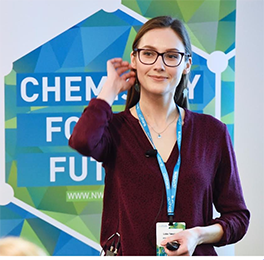
My name is Liubov and I am a 4th year PhD in the group of Chemical Biology. My research lies in the fascinating field of bacterial sugars and complex structures thereof. I am especially interested in exploring them as novel antibiotic targets and means to combat the ever-growing antibiotic resistance. For this, I am investigating the nuances of bacterial systems that produce these complex sugar structures to obtain handles for manipulation and inhibition. The main focus is to develop highly pathogen-specific drugs that either render microbes harmless or eliminate them with maximum efficiency - scenarios that minimize the evolution of resistant bacteria.
In my career as a researcher I want to dedicate time and effort not only to solving scientific problems but also to communicating them. I believe that it makes science more approachable for the general public instead of remaining a black box of wonders.
Explaining complex scientific topics in an enticing, understandable and easy to follow way is an invaluable, albeit difficult skill to master. By participating in outreach, I aim to gain experience in communicating science and creating a sense of involvement for people who are not involved in a research day-to-day, but who are influenced by it nonetheless. I believe that with outreach we can help people fit scientific research into their worldview, become more informed and make better judgements in their everyday life.
Eko Rahmadian - Campus Fryslân
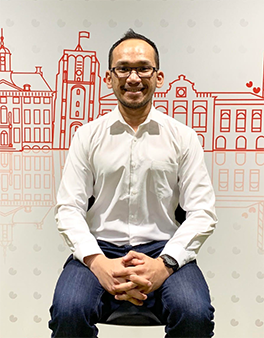
My name is Eko Rahmadian, I am a first year Ph.D Student at Campus Fryslân, University of Groningen. My research topic is ‘Exploring the use of big data for sustainable tourism’. Tourism has brought a big impact for this world, particularly when we discuss economic contribution to destination objects. However, the negative impacts of tourism activities are also indisputable, especially when we argue about the impact of tourism on environment, sociocultural, inequality, or other dimensions. In terms of SDGs, ability to manage sustainable tourism will address at least goals 6 (clean water and sanitation), 8 (decent work and economic growth), 11 (sustainable cities and communities), 13 (climate action) and 17 (partnerships for the goals). However, managing sustainable tourism is not an easy mission as it needs strong cooperation among stakeholders. As back in my home country, Indonesia, I work for National Statistics Office (BPS) Indonesia, I realize this goal has become more challenging due to the lack of data. Therefore, during my research period I would like to explore the most important big data covering specific dimensions to help the government and related stakeholders for a data-driven policy-making process.
I join this competition to share my thoughts with the bigger audience that even though tourism could be amusing, it could be threatening at the same time.
Vicente Artola Arita - Medical Sciences
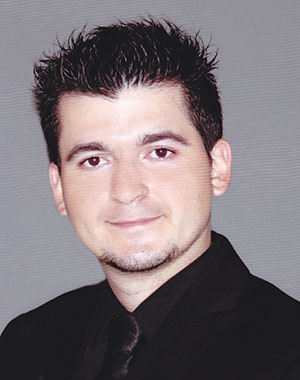
Vicente Artola Arita received his Doctor of Medicine degree in 2012 at Universidad de El Salvador, El Salvador, Central America. In 2015 he received both his Master degree in Health Administration at Universidad Andrés Bello, El Salvador and Master degree in HIV at Universidad del Rey Juan Carlos, Spain. He has done healthcare research at the National Health Institute and at the Salvadoran Social Security Institute in Salvador; in 2018 he started his PhD fellowship at the Department of Cardiology, UMCG, the Netherlands. He is one of the 16 Early Stage Researchers from the PROMINENT consortium focusing on personalized medicine. His aim is on pathophysiological mechanisms of atrial fibrillation. His research topics include biological pathways and early echocardiographic markers of atrial fibrillation. He collaborates on studies on the matter such as AFRISK and RACE V.
Jana Volaric – Science and Engineering
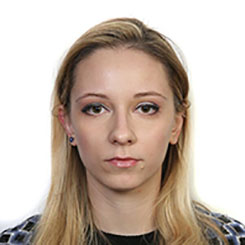
I am a PhD student working on developing novel photo responsive molecules which can be used to manipulate biological systems by light. My research focuses on creating water-soluble molecules which change their three-dimensional structure upon irradiation with specific light. This process is reversible and the molecules can switch from one state to the other repeatedly with different colored light. We have attached our molecules to a potent pore-forming toxin in order to control its activity by an external stimulus. Pore-forming toxins are proteins that bind to the surface of cells forming a perforation that causes cell content leakage and cellular death. We have shown that we can reversibly control pore formation by light and our modified toxin successfully ruptured cancer cells in one state, while the other state left all the cells intact. By restraining its activity with light, we can potentially use this toxin to our advantage and destroy cancer cells simply by shining light on the tumor.
I decided to participate in the 3MT competition to gain experience in presenting my research in a concise and clear way, as well as to get a chance to tell my research story in front of a broader audience.
Mara van der Ploeg – Arts
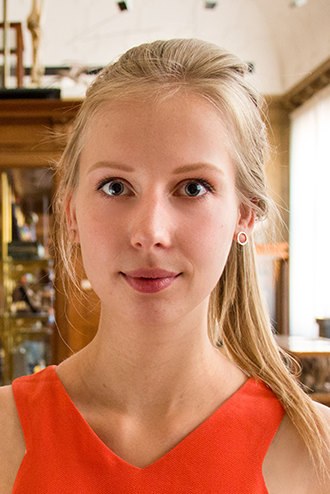
Hi, I am Mara and I am a huge fan of vintage things. I always joke that this explains why I chose to do research on seniors. Currently, I am in the second year of my PhD and I am looking at language learning in older adulthood. My main curiosity is to see if language learning can be used as an anti-ageing tool to help keep your brain fit. The hypothesis is that learning a language later in life might delay the onset of age-related illnesses such as Alzheimer’s. However, as no research has been done on the best way to teach seniors a new language, that is the second focus of my study.
I am participating in the competition because my research has such a societal impact on seniors and healthy ageing that I want to share it with people. The message that I want to get across is that even when you are older, you can still learn a new language and it might even have health benefits.
Isabel Britsch – Medical Sciences
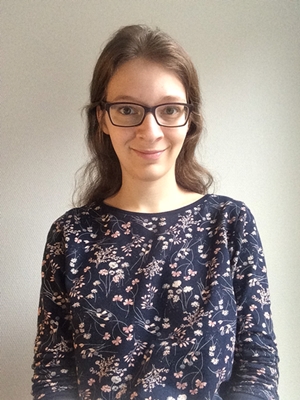
Coming from a Molecular Medicine background with a strong focus on human disease mechanisms, I became early on particularly interested in cancer research. During my Master studies in Sweden and the Netherlands I found my passion for Cancer Immunotherapy, a field that exploits the (naturally ongoing) immunological processes in our body to treat cancer. Within this relatively new field, I currently work on an approach that makes use of so-called T-killer cells. T-killer cells are one of the most potent immune cell types in our body and usually help us to defeat (viral) infections. With the help of a drug in the format of a fusion protein, I redirect them to attack and kill cancer cells instead of their original target.
Are you curious about how this works practically? Then stay tuned for my pitch! I am participating in the 3MT to get insight into presentation techniques outside of the usual daily work environment. I want to learn more about the tips and tricks for addressing a general audience instead of a group of scientific experts. I hope to improve my presentation skills while sharing my enthusiasm about one of these many promising possibilities for immunotherapy-based cancer treatment with you.
Jordi Antoja Lleonart – Science and Engineering
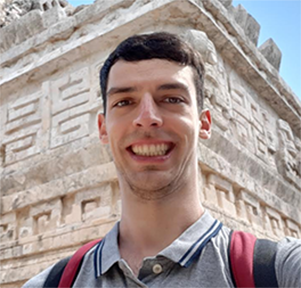
Hey there! My name is Jordi Antoja Lleonart and I grew up near Barcelona. In my teens I was very interested in science in general, but I never could decide what to specialize in. At some point I decided to do all of them and got my bachelor’s degree in Nanoscience and Nanotechnology at the Autonomous University of Barcelona (UAB). After that, I moved to Groningen to get my Master’s degree in Nanoscience. Now I am still here, at the Nanostructures of Functional Oxides group of the RuG, finishing my PhD project. I am now mostly interested in inorganic materials research and so far, I have focused, shockingly, mostly on thin films of functional oxides. I worked on high-temperature superconductors for a while, then on ferroelectrics and currently on synthesizing quartz, which is a very old but also very challenging material.
When I am not doing science or writing about science, I enjoy playing videogames and dancing. People won’t shut up about how “I talk good” so I decided to sign up for the 3MT competition, that way either I win, which is nice, or I lose and they have to find something else to talk about. Seriously though, every now and then I enjoy having an opportunity to explore a new skill or hobby, and I believe this competition can be one such opportunity.
Saskia Accord-Maass - Medical Sciences
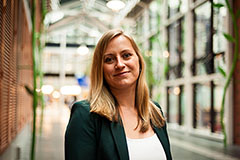
Who am I?
I just turned 34 and I am a (step-)mother of four. I was born in the southern part of the Netherlands and that is also where I studied medicine. After graduating in 2011, I worked as a general surgery resident. After that, I worked as a researcher for the Plastic and Reconstructive Department of Toronto General Hospital in Canada, where I evaluated different aspects of breast reconstruction.
My research?
Currently, I am in training to become a general practitioner. I am combining this with a training in Epidemiology and with a PhD trajectory at the Department of General Practice & Elderly Care Medicine at the University Medical Center Groningen. The subject of my PhD is ‘Long-term effects of breast cancer treatment’. Specifically, our research focuses on the cardiac and psychological consequences of treatment. The latest publications of our study entail the prevalence of cardiac dysfunction and psychological distress among breast cancer survivors, 10 years after breast cancer diagnosis.
Why participate?
Participating in the 3-Minute-Thesis Competition could help raise attention and awareness to my subject, the long-term psychological effects of breast cancer.
